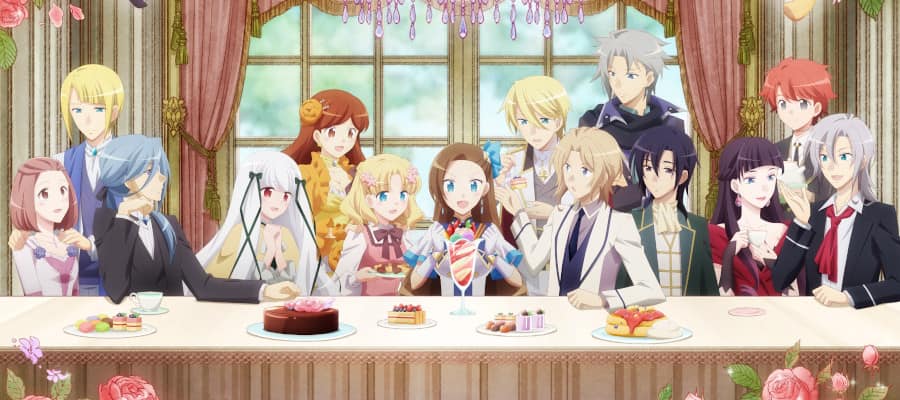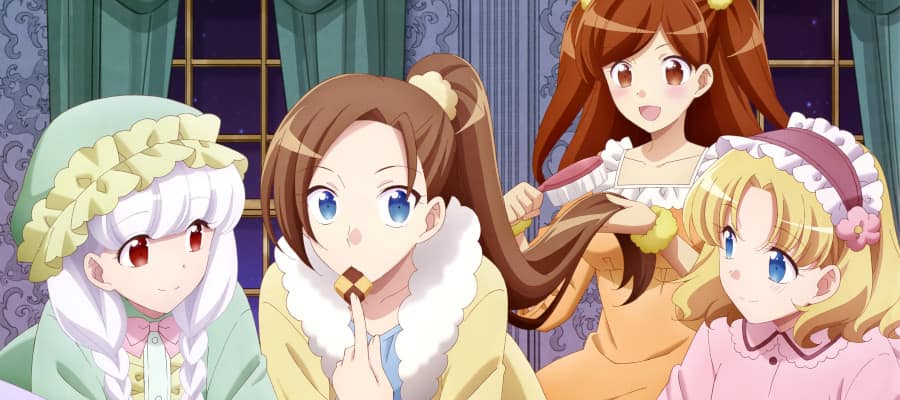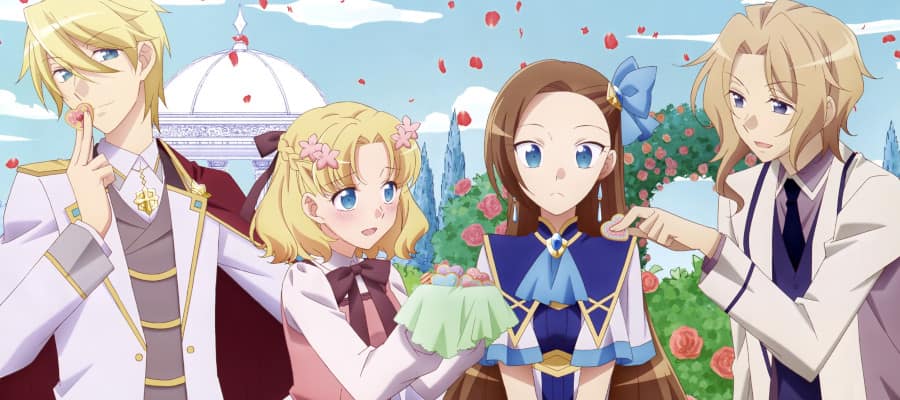This year has reminded me of something I truly, truly love about anime as a genre: You get a self-contained story idea, usually something with a bunch of familiar anchors, and then says ‘okay, now here’s the idea we’re working with in this space.’ You get useful, familiar tools for telling a story (so you don’t need to reinvent the wheel to communicate ideas), and then that lets the story highlight what parts of it stand apart from the standard patterns.
Here’s your standard template: an anime that tells the story that plays out in your typical otome game dating sim, where the characters are divided easily into ‘the ones you want to have sexy stories with’ and ‘the ones who are rivals or hindrances to your sexy stories,’ set in a magical mid-fantasy kingdom where you get fancy outfits, princesses and magical colleges, but also there’s no conspicuous mention of plague or weird pooping habits. Then, there’s the also-standard form of it being a story focusing on a single individual who is from our world, an isekai story, or if you’re familiar with the Christian media space, Narnia-likes.
Here’s your twist: The world she’s in now is the world of a videogame she played when she was in our world, she knows how this type of game works, like the things that signal you’re on the wrong track, but she’s not in the role of the hero of the story like when she played it.
She’s the villainess.
And the villainess, in all the routes of the games, is screwed.
Our heroine villainess in this story is one Catarina Claes, a haughty, superior mean girl archetype, usually popular in this kind of game because the players want her to step on them of how her awful behaviour enables dramatic scenes. After all, if your hunky boy dream rescues you from a mean bully, that bully had better be actually mean to raise the stakes. Catarina is at the centre of a whole web of relationships in the magical academy, as she is a good student, rich, and has a lot of social importance, being the daughter of a duke, and being engaged to an Important Hunk as this genre represents them.
She is also, now, in this version of the story, a Japanese schoolgirl who played this game and absolutely does not want to be killed to death because of a stupid misunderstanding about dating boys. Beginning at age eight (when she first discovers her past life, thanks to an absolute cracker of a head injury) Catarina dedicates her life to the task of Not Dying by doing everything in her power, strategically, to prepare for all the possible outcomes that could befall her. This includes swordfighting lessons, magical study, learning how to farm and make her own food, searching for weaknesses from people she knows will be a danger to her later, and then, most importantly, not being a massive asshole to everyone around her.
Now, if you’ve played this genre of game, you might have wondered about how terribly the dialogue options forced you into being some varity of dickhead, and have the followup thought of: Man, imagine if someone who was just basically nice showed up here? Yeah, that’s what Catarina does, and the result twists the whole story around her new role, despite her prior positioning, all preparing for the moment the ‘hero’ of the game comes along.
That’s your basics, whatever, that’s kind of all covered in the pitch. Why did I like this, specifically, why did I find this series on a whole so engaging and why do I like Catarina so much? Sure, it’s an anime that tells a story through the medium of games, but that’s common enough, the only thing this does that separates it from those other anime is this one’s not awful about it. Seriously, there’s no appearance of characters pulling up RPG menus and god damn if that didn’t thrill me when I realised it. Nonetheless, that’s more avoiding negative marks, let’s talk about positives. There are, in my mind, three basic things that to recommend Very Long Title I’m Not Going To Copy-Paste Right Now.
First of all, it’s funny. One of the most damning things for me when it comes to romantic comedies — an exhausting genre that’s been the spine of whole time slots for my entire life — is that it’s not actually very funny. A lot of the time, comedy in that genre relies on delivery from characters, and not actually anything that happens in the type of story it is that generates humour. It’s about characters being embarrassed or humiliated or it’s about a character having witty dialogue, and those things can be removed from romantic narratives. I dunno, it feels like this is a genre that doesn’t tend to work with itself; it’s more ‘thing A, while being thing B.’
Second of all, and this is a big part of how it’s funny, Catarina is an idiot. Oh, she’s not stupid: she’s focused on her task, hard-working, charming, sweet, and emotionally sensitive. When presented with a social strata of aloof nobility, she differentiates herself by being, well, a normal gamer gremlin girl trying to solve for a game’s outputs, and that means a lot of astute planning and note-taking, but also, eating food with her hands off the ground and not noticing when she’s demolished an entire basket of muffins. These planning experiences, rather than having her internally monologue extensively, are done by showing five chibi versions of her in a little mind palace display negotiating what they think is the best course of action, and one of them is a self-important type with a fake mustache and I find that very funny, of its own.
Hang on, you may say, if Catarina is smart and inclined to plan, and kind, how is she an idiot? Because,
Third of all, god damnit, Catarina is a bisexual casanova who hasn’t noticed the sheer scope of her kingdom. Every single major character in the game and a few minor ones all wind up caught in her orbit. Sure, one of them was going to be engaged to her anyway, but in the game, he maintained that relationship to avoid any other inconvenient engagements and he didn’t actually like Catarina. In this case, Catarina’s swerve into being the best little gremlin meant he grew up finding himself attracted to her, and so to for all the other characters that the heroine is meant to be picking from.
The thing is, she doesn’t stop there, because each of those boys has a love interest who’s designed to be a barrier for the heroine of the game, as well, and Catarina manages to seduce each of them by sharing common interests and being the coolest girl they know growing up and showing them care and attention and sharing books with them that are definitely gay porn, and then when the heroine of the game shows up, Catarina’s plan to Not Die to her makes this otome-game leading marshmallow girl into another one of the Claes Of Sixty Nine.
Everyone wants Catarina, and Catarina is so focused on not dying she doesn’t realise it.
This is an anime focusing on a kind of game that I normally find dreadfully difficult to play, because they often rely on arch character types and uh, way too much handsiness from dudes who are garbage. The otome genre is populated by a lot of games that rely on pleasant aesthetics and sometimes untranslatable complications, which means that the behaviour of characters can seem incomprehensible to me, a person who’s not already heavily invested in their space.
I find it very funny to appreciate the way that, yes, actually, if you wrote characters that behaved like characters and weren’t fixated on a limited number of possible solutions (that meant the writers aren’t under a huge burden), and if you can recognise that bisexuality and polygamy exist, actually, a lot of these dumb games about silly narratives are very easy to resolve in an uncomplicated way.
I thought this series was an absolute corker. Season 1 is a lot stronger, where it focuses on the actual challenge of getting away from the narrative inevitability of dying, but Season 2 has a lot of great moments of Catarina being an absolutely perfect goblin. Season 2 does also focus a lot more on resolving some of these things, and introducing more of that otome game fanservice, which I found less interesting.
This is the series that introduced me to the term bakadere, and I love it.



